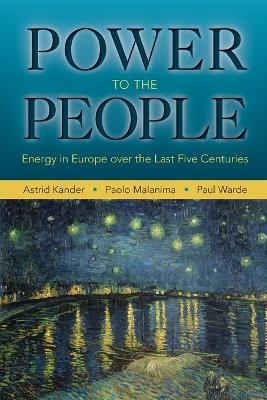
Power to the People
Princeton University Press (Verlag)
978-0-691-16822-7 (ISBN)
Power to the People offers new perspectives on the challenges posed today by climate change and peak oil, demonstrating that although the path of modern economic development has vastly increased our energy use, it has not been a story of ever-rising and continuous consumption. The book sheds light on the often lengthy and complex changes needed for new energy systems to emerge, the role of energy resources in economic growth, and the importance of energy efficiency in promoting growth and reducing future energy demand.
Astrid Kander is professor of economic history at Lund University. Paolo Malanima is director of the Institute of Studies on Mediterranean Societies at the National Research Council in Italy. Paul Warde is reader in early modern history at the University of East Anglia and research associate at the Centre for History and Economics, Magdalene College, University of Cambridge.
Preface ix CHAPTER ONE Introduction 1 CHAPTER TWO Definitions and Concepts 17 PART I Pre-Industrial Economies Paolo Malanima 35 CHAPTER THREE Traditional Sources 37 1. Energy in Premodern Societies 2. Organic Sources and Agricultures 3. Non-organic Sources 4. Seven Long-run Propositions 5. Conclusion CHAPTER FOUR Constraints and Dynamics 81 1. Population and Climate 2. Energy Scarcity 3. Saving Land 4. Saving Labor 5. Conclusion PART II The First Industrial Revolution Paul Warde 129 CHAPTER FIVE A Modern Energy Regime 131 1. The Take-off of Coal 2. Traditional Sources: Rise but Relative Decline 3. Conclusion CHAPTER SIX The Coal Development Block 159 1. The Core Innovations 2. The Growth Dynamics of the Coal Development Block 3. The Transport Revolution CHAPTER SEVEN Energy and Industrial Growth 209 1. Coal and Growth 2. Seven Long-run Propositions 3. Energy Intensity and Economic Structure 4. Conclusion PART III The Second and Third Industrial Revolutions Astrid Kander 249 CHAPTER EIGHT Energy Transitions in the Twentieth Century 251 1. The Rise of Oil and Electricity 2. Old and New in Energy Regimes 3. Conclusion CHAPTER NINE Major Development Blocks in the Twentieth Century and Their Impacts on Energy 287 1. The ICE-Oil Block 2. The Electricity Block 3. The ICT Development Block 4. Conclusion CHAPTER TEN The Role of Energy in Twentieth-Century Economic Growth 333 1. Development Blocks and GDP 2. Seven Long-run Propositions 3. Energy Intensity and Economic Structure 4. Conclusion CHAPTER ELEVEN Summary and Implications for the Future 366 1. Summing Up the Book 2.Thinking about the Future 3. Some Remarks about the Future APPENDIXES A. The Role of Energy in Growth Accounting 387 B. Decomposing Energy Intensity 1870-1970 395 C. The Impact from the Service Transition on Energy Intensity 402 D. Biased Technical Development 411 References 415 Index 451
| Reihe/Serie | The Princeton Economic History of the Western World |
|---|---|
| Verlagsort | New Jersey |
| Sprache | englisch |
| Maße | 152 x 235 mm |
| Gewicht | 624 g |
| Themenwelt | Geschichte ► Allgemeine Geschichte ► Neuzeit (bis 1918) |
| Geschichte ► Teilgebiete der Geschichte ► Wirtschaftsgeschichte | |
| Naturwissenschaften ► Biologie ► Ökologie / Naturschutz | |
| Naturwissenschaften ► Physik / Astronomie | |
| Technik ► Elektrotechnik / Energietechnik | |
| Wirtschaft | |
| ISBN-10 | 0-691-16822-9 / 0691168229 |
| ISBN-13 | 978-0-691-16822-7 / 9780691168227 |
| Zustand | Neuware |
| Haben Sie eine Frage zum Produkt? |
aus dem Bereich


